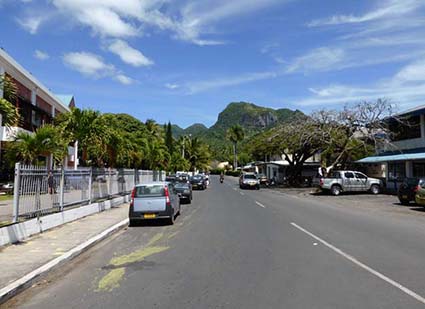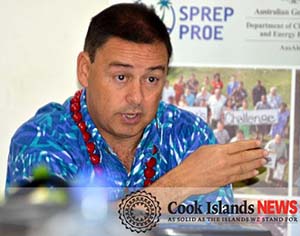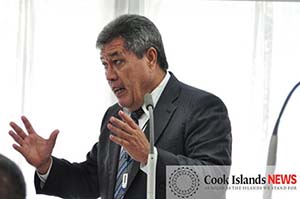
The Cook Islands still has no confirmed government more than two months after a general election. Allegations of fraud and bribery have sparked a poisonous political environment, as Asia-Pacific Journalism journalist Lasse Underbjerg finds on a visit.
Cook Islands Finance Minister Mark Brown is calling for “tidying up” electoral reforms after an election in July has plunged the country into allegations and recriminations about the future.
In an interview with Pacific Scoop he says it is “unfortunate” that the electoral process due a high number of petitions challenging the results has forced a long period of uncertainty for the people.
“We need to look at some sort of amendments that will tidy up the electoral process and pre-empt a majority of petitions which focus on voter eligibility,” he says.
“The establishment of a fulltime electoral office and chief registrar could be a step in the right direction.”
Following the July election, a fierce contest has played out in the courtrooms with a total of nine petitions with allegations of fraud and bribery lodged from the defeated Democratic Party against the ruling Cook Islands Party, which at present holds a slim majority with 13 seats in the 24-seat Parliament.
Out of those nine, the Democrats have since withdrawn three petitions, the High Court has dismissed five and one is still pending.
Appeals under way
But in the latest development, Democratic Party leader Wilkie Rasmussen says the party will also appeal up to three of the petitions it filed against the general election results, which were thrown out by the High Court.
Finance Minister Brown says the appeals will be an additional time-consuming and expensive process.
In an interview with Radio New Zealand earlier this week, he said his party just wanted to get on with the job of serving the people.
“It’s delaying a lot of the government process that we have in hand – such as the budget,” he said.
“It’s delaying the approval of work projects the government would like to implement, and this is starting to cost the people in the country money. These delaying tactics that the opposition are using to try and again overthrow the decision that was made by the people during the elections.”
But Rasmussen says all legal costs are being funded within the party.
“We’ve got lots of supporters who came forward and helped us with the petitions. We are and have always been in the better position financially than the Cook Islands Party. Whatever he has commented, he is not privy to what we have and to the details of what we have,” he told Radio New Zealand.
Paying the price
Meanwhile, the journalists in the country are experiencing frustrations from the public. Emmanuel Samoglou, senior political reporter with the Cook Island News has covered the election and he sees problems with the delays.
“My discussions with the public have revealed some frustration with the process,” he says.
“The election was called in April, and there is still no confirmed government with full legislative powers.
“It has stalled a number of pieces of legislation and an electoral reform fill that has the potential to overhaul the undertaking of elections in the Cook Islands. Essentially, it stalls the agenda.”
And there is reason for concern, according to associate professor Richard Shaw, associate head of school of the politics programme at Massey University.
“If there is a perception that the parties refuse to move on, that is very problematic,” he says.
He has not been following the Cook Islands election closely, but does see concerns for development.
“Potentially the most fatal consequence is loosing public faith. If there is a degree of scepticism, the longer this goes on, the more it will erode the confidence in the political arrangements, and if it does not reach a solution the public will start agitating for constitutional reform.”
Lisa Williams-Lahari is a longtime Cook Islands journalist and Pacific region freelancer/media trainer, now heading communications for the Forum Fisheries Agency in Honiara, Solomon Islands.
To her political uncertainty doesn’t look good in any country, but she thinks it does stir important questions and debates around the status quo and personal versus community perceptions of politics and politicians.
“The positive impact of uncertainty is it shakes the tree up and reinvigorates politics. It also does away with a sense of complacency, which isn’t good for leaders who want to be in touch and engaged with their voter base,” she said.
Lingering aftermath
A final petition, which is expected to break an election night tie in the electorate of Mitiaro, is expected to reach court shortly.
If the final petition stands, it could have great impact on the voters, according to Emmanuel Samoglou.
“That could change everything. That seat is held by the Cook Islands Party, and if the petition is upheld, it will swing [the result] to the Democratic Party, taking away the ruling party’s majority. A coalition government would need to be formed, and if that fails, voters could possibly be forced to head back to the polls.”
“The bottom line is things are still very uncertain,” he says.
Williams-Lahari believes the aftermath of this election is going to be significant in the Cook Islands.
“I think some of the results are going to have long lasting impacts well into the next election and, depending on how things shape up, this will show whether the returned government and the opposition is listening to the warning signals of the polls,” she said.
This work is licensed under a Creative Commons Attribution-NonCommercial 3.0 New Zealand Licence.
COOK ISLANDS POLITICS IN A NUTSHELL
• Some of the major issues in the Cook Islands are: tourism, fisheries, taxation and skilled migrants heading overseas. With only 14,000 people living on the islands, many electorates are small, and a handful of voters can decide who will win a seat in Parliament.
• About 10,500 registered total voters
• 52 candidates, including two independents
• 24 constituencies, most contestants only have a few hundred voters
• Three major parties are: Cook Islands Party, Democratic Party, One Cook Islands Party
• In the last edition in 2010, Cook Islands Party won a majority with 16 seats of the 24 seats.



